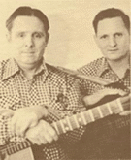For thousands of people, the phrase “old time country music†does not suggest fiddle bands like the Skillet Lickers, nor the banjo styles of someone like Uncle Dave Macon, nor the lonesome blues of Jimmie Rodgers. Many people associate the phrase with the close-harmony brother duet singing of the 1930’s, the type represented by the Delmore Brothers, the Blue Sky Boys, the Callahan Brothers, the Monroe Brothers, and many others. By the 1930’s radio had made possible a new singing style – soft, smooth, plaintive, and even delicate – and an entire generation of country music developed around the new radio stars with their lilting, sentimental music. Though the “brother duet†style influenced modern country music to some extent, and modern bluegrass to a great extent, it has been one of the forgotten styles in today’s renewed interest in country music’s roots. Hardly any of the original brother duets are still around; the Blue Sky Boys still make a few records, but they seldom tour. The fan who enjoys this type of music has generally had to content himself with reissues of the original 78’s made generations ago.
For over 50 years the Englands have been quietly preserving the close-harmony style. Without fanfare, without being self-conscious preservers, the Englands continued to play the old songs in the old styles, playing in their own front room, on small-town radio stations, and for local gatherings in central Alabama. Only in the mid-1970s did the Englands begin to make concert appearances at bluegrass festivals and old-time fiddling contests. To say that they call up memories of the Delmore Brothers is understating it: they call up memories of a whole generation of country music that has been unjustly neglected. And the crowds responded accordingly: the older people, noting the Englands’ checked shirts and Otis’ tenor guitar, occasionally mistook them for the Delmores (who had not graced the stage for 20 years); the younger people saw in them the origin of much bluegrass and even some rock styles. And Otis and Orby themselves were as surprised as anyone; they had thought their music was “outdated†and had played mainly for their own enjoyment.
Orby and Otis come from Jefferson County Alabama, from a hamlet named Midway, near Adamsville. Both spent early years working in the coal mines, and one became a contractor and the other a mine foreman. They began playing in the 1940’s, and listened a lot to groups like the Milo Twins, the Carter Family, the Baker Brothers, the Louvin Brothers, and the Blue Sky Boys. But their prime influence was the Delmore Brothers, from nearby Limestone County Alabama. They met the Delmore Brothers on several occasions and absorbed much of their style and repertoire; they often perform Delmore style songs that the Delmores never recorded but often did in concerts (such as “Maple on the Hill.â€) Otis recalled visiting Alton once and learning how to tune his tenor guitar “Delmore Style,†this involved tuning the bass string to G, and the other three to D-A-E. This tuning made it much easier for Otis to play the kind of runs Rabon Delmore used to make. Many felt the Englands’ sound is an uncanny reproduction of the Delmores’, the brothers were not so sure. “If people think we sound like the Delmores, that’s because they’ve been dead a long time now,†said Otis. His brother Orby added: “I wouldn’t want anybody to think that were were trying to mock them. That’s impossible. They were one of a kind. We just play some of their songs that we like a lot.â€
The Englands have played the famous Renfro Valley Barn Dance, and were fixtures on Birmingham radio station WVOK’s “Saturday Jamboree†in the 1950’s; they have also appeared on Country Boy Eddie’s TV show out of Birmingham. For years the people of central Alabama responded to their old tunes and sweet style, but the Englands felt that their music would have only limited appeal beyond that area. For a time in the early 1950’s they considered going professional, but the sudden rise in rock discouraged this. Except for one small-label 45 single cut in the 1950’s, Twilight in Alabama is their only album.
On October 27th, 2003 the England Brothers were offically recognized as ’Musical Acheivers’ by the Alabama Music Hall of Fame!
